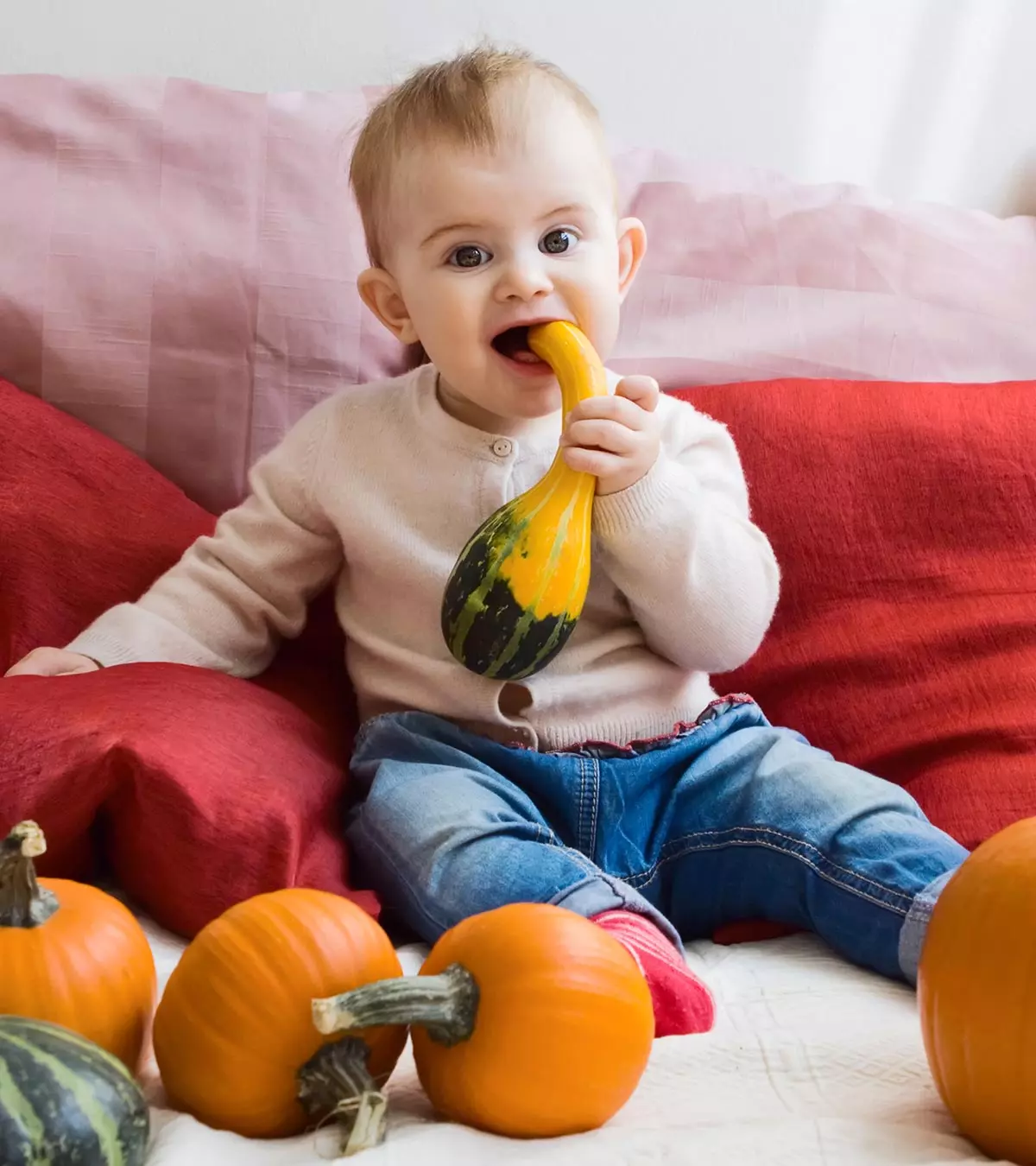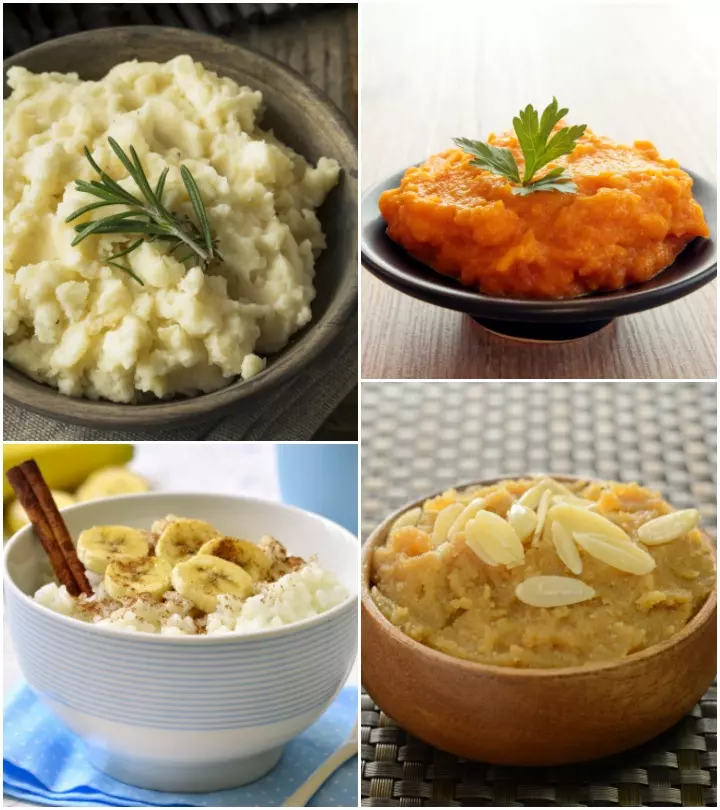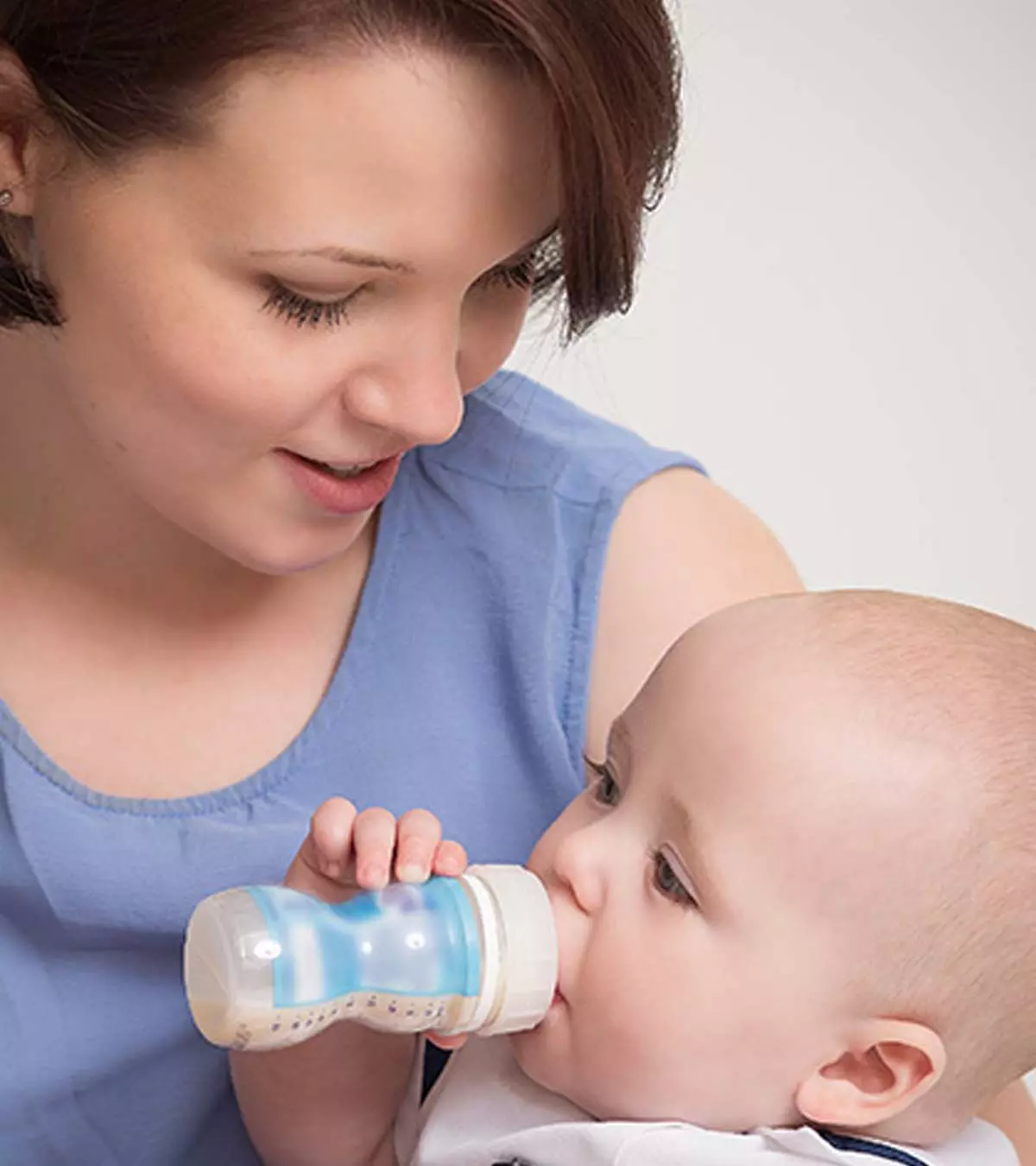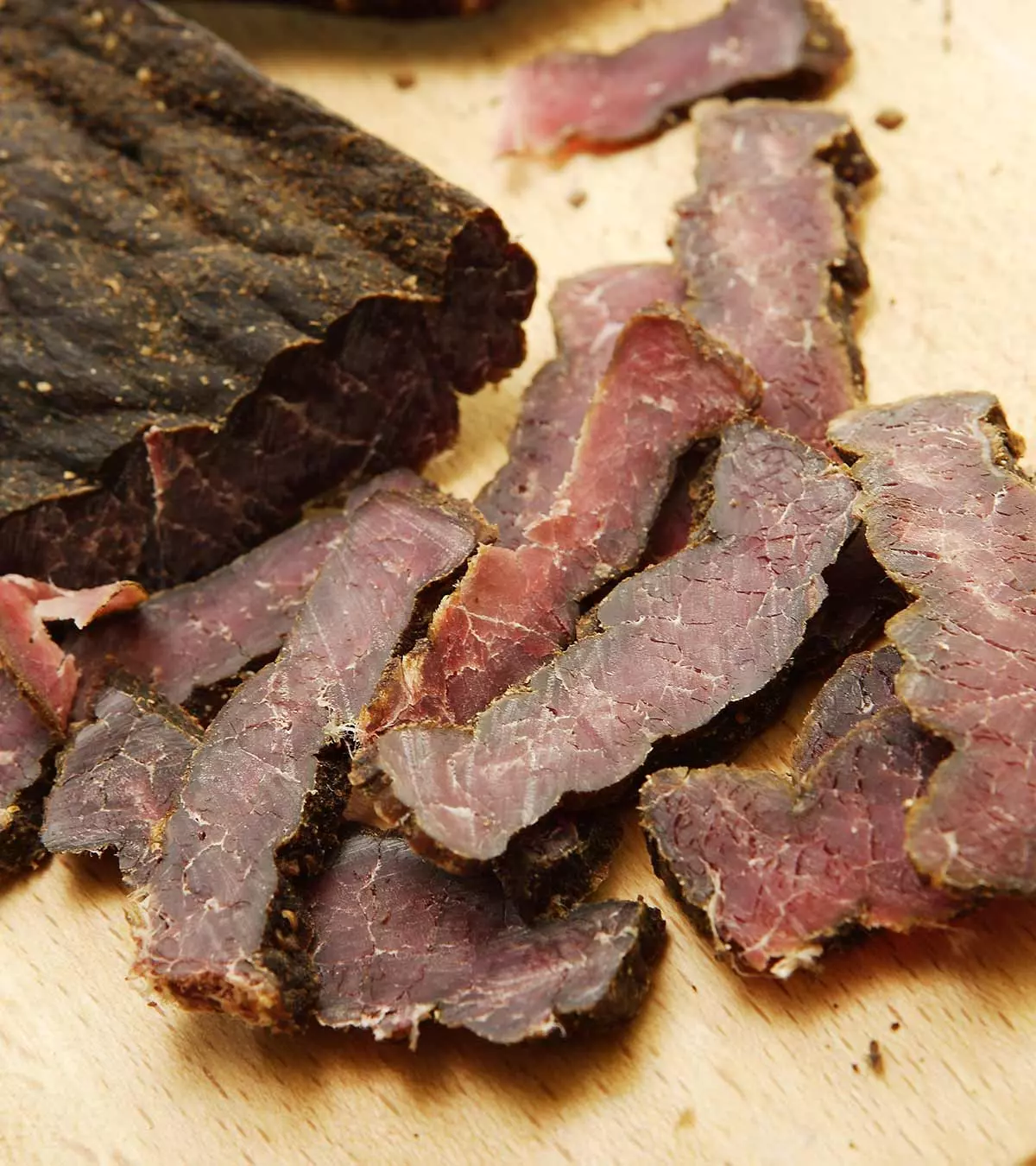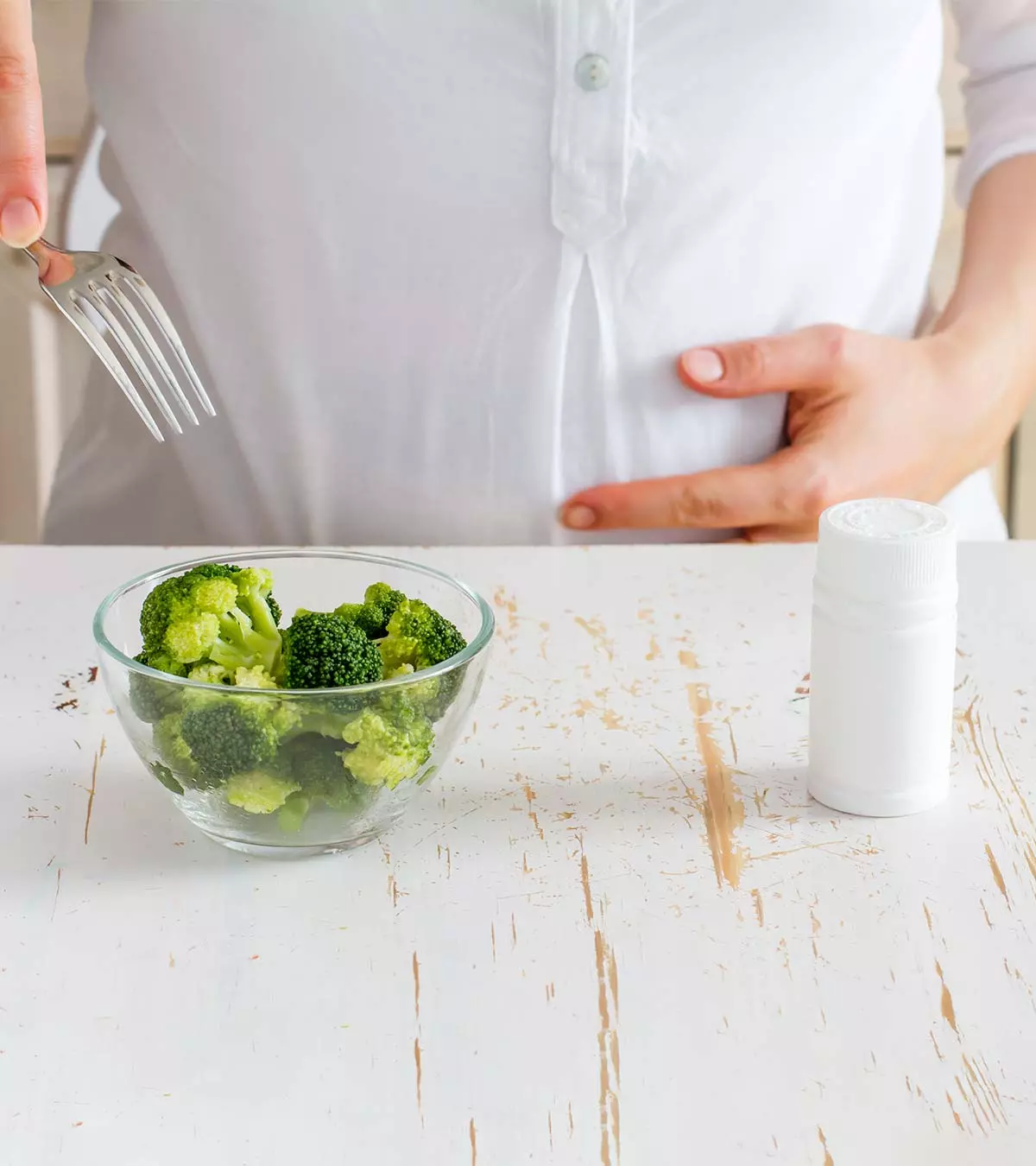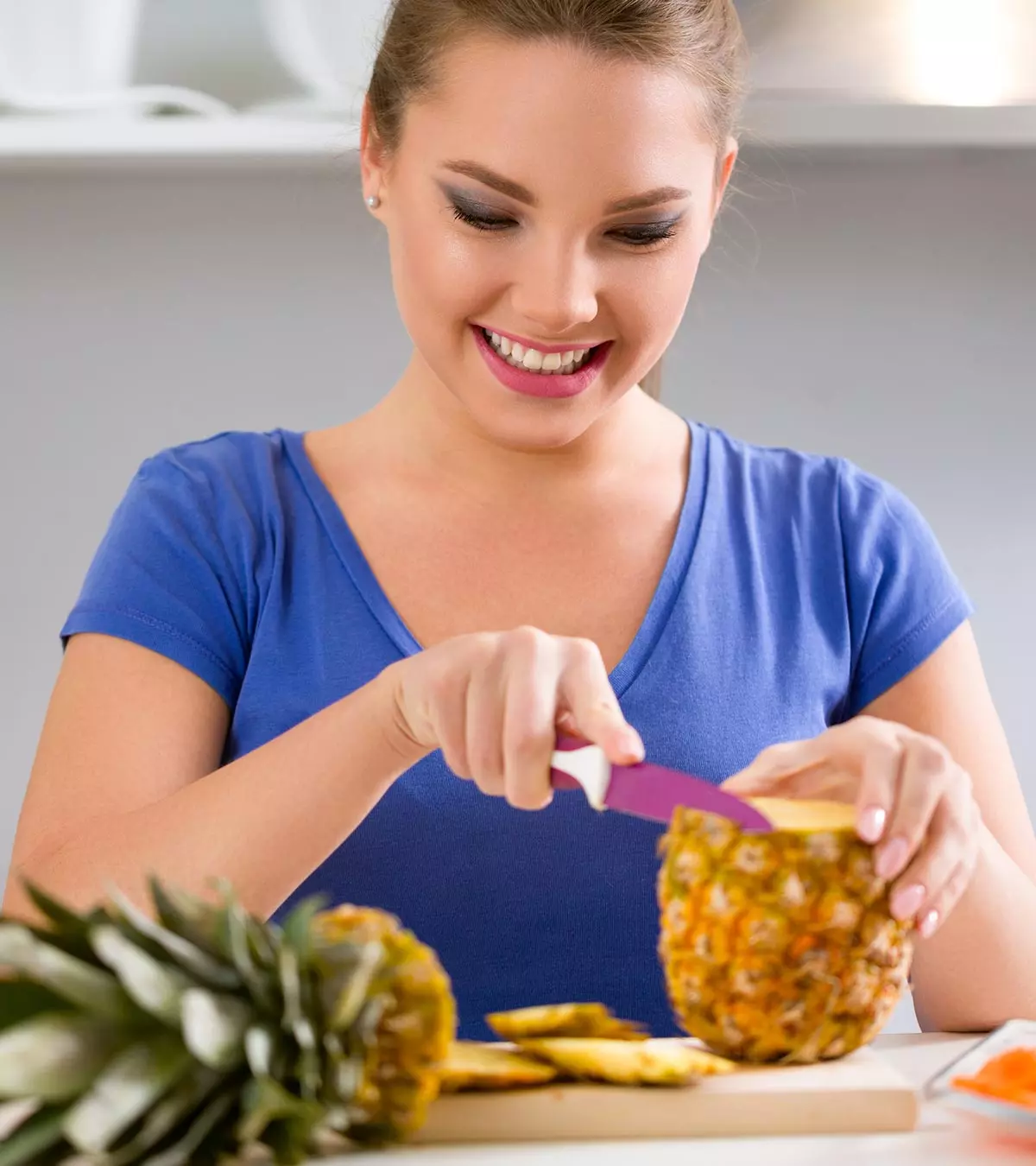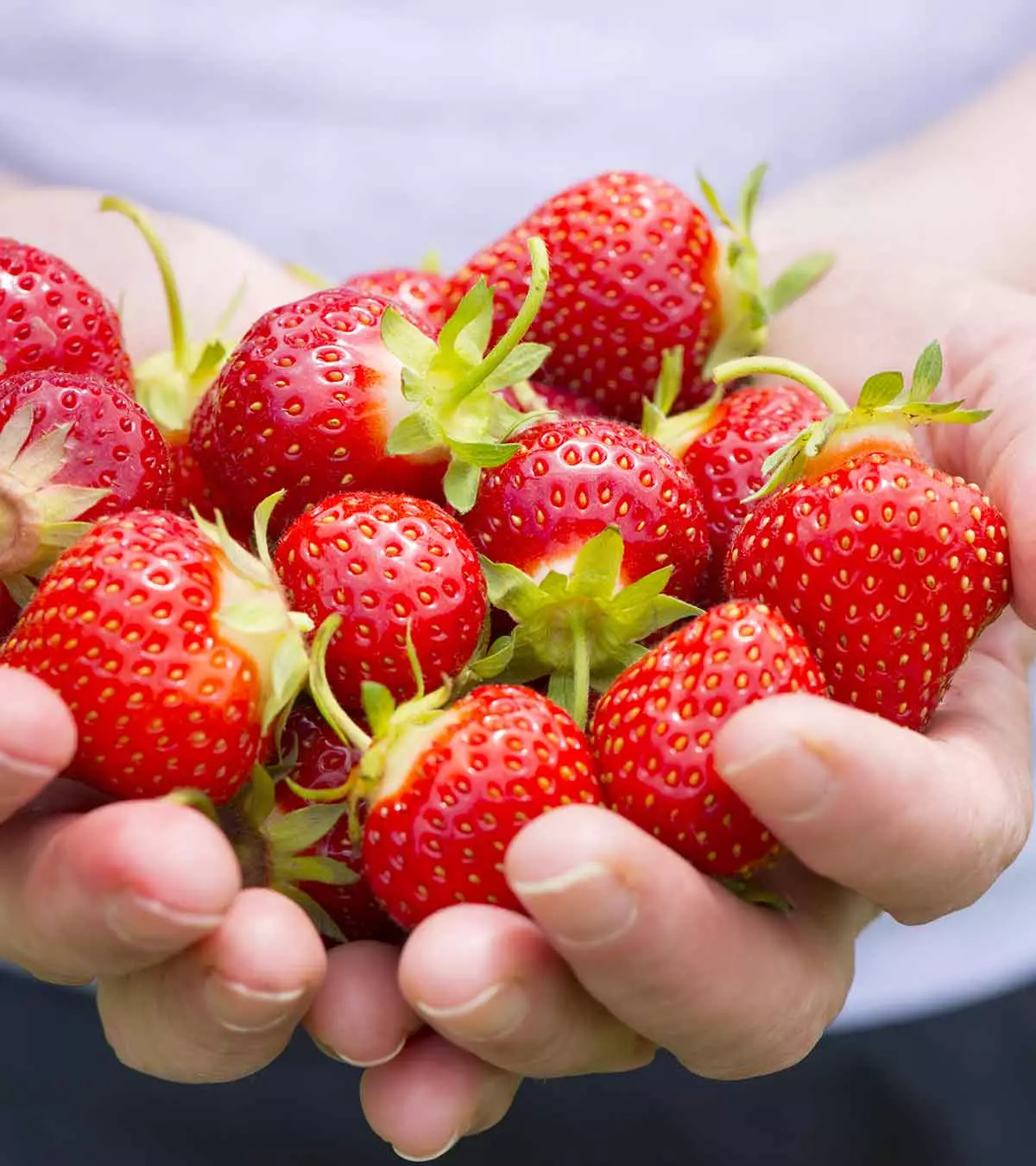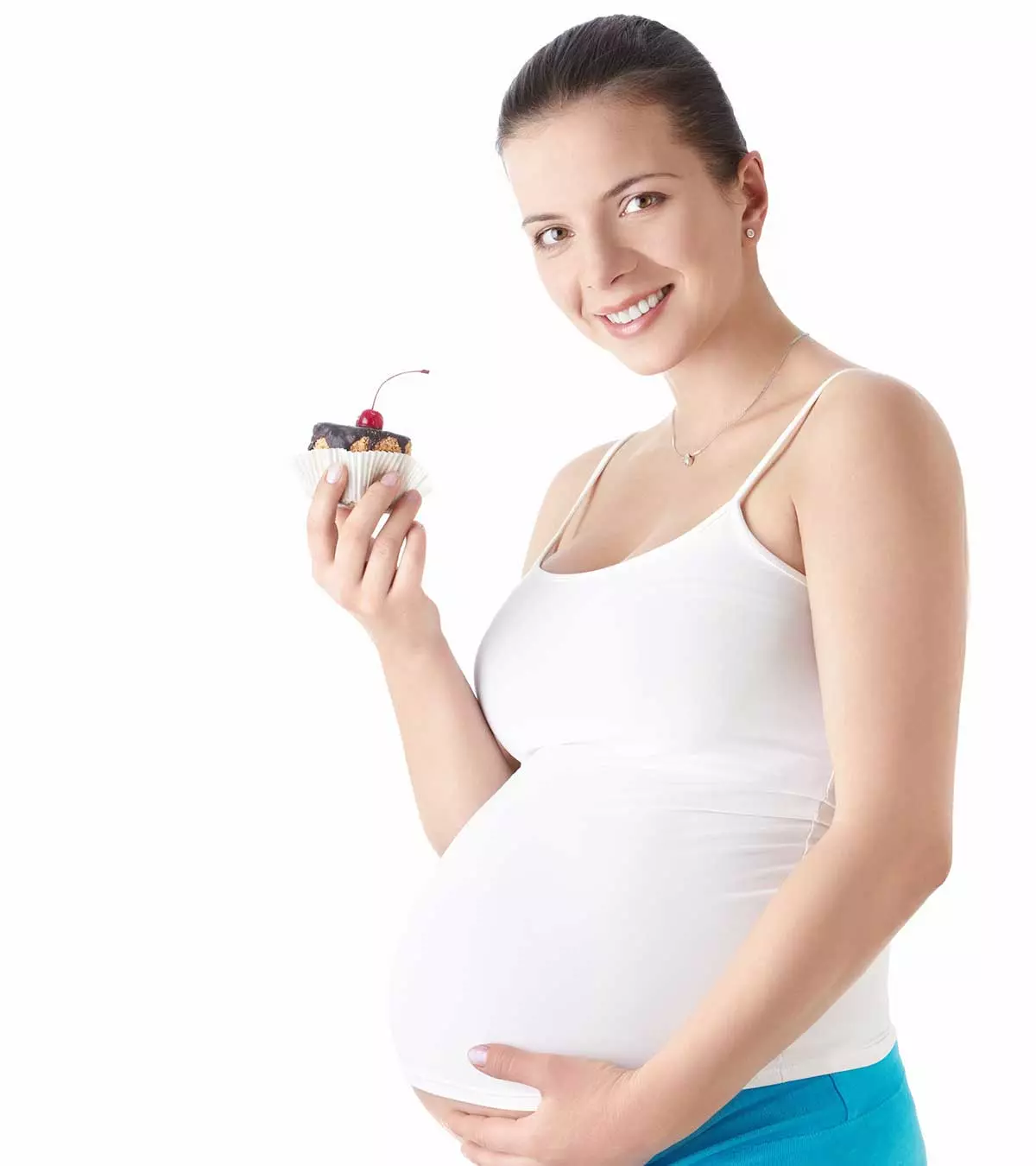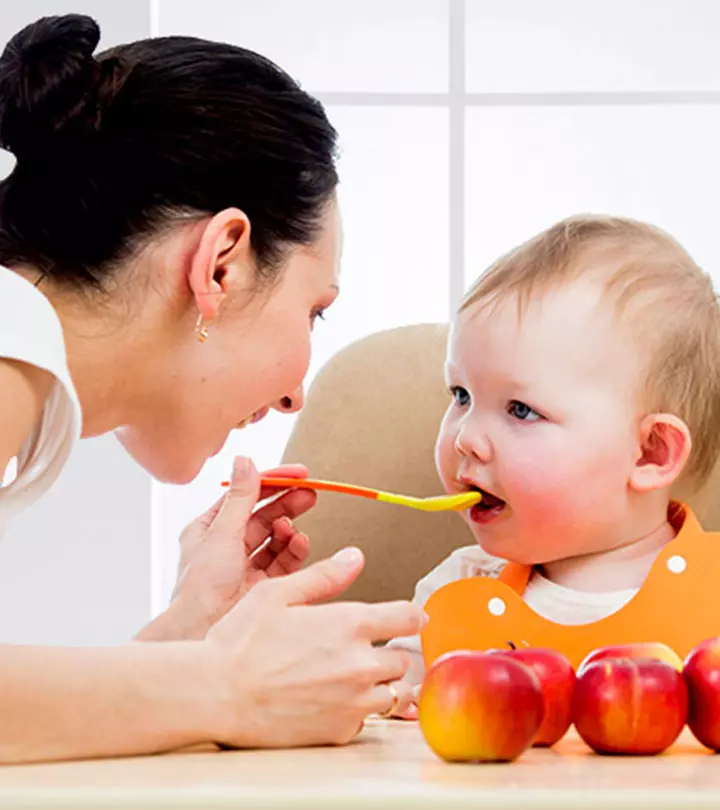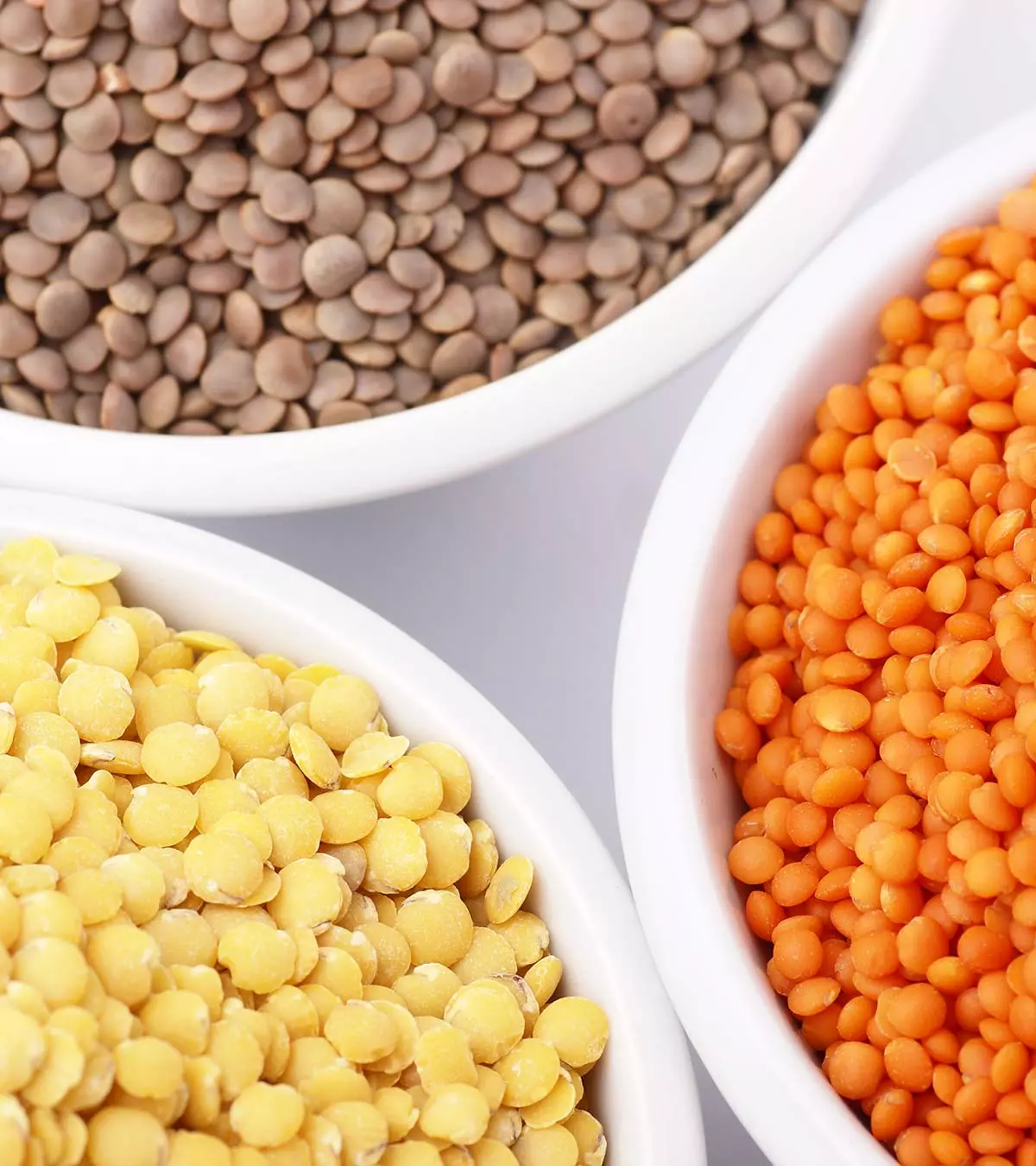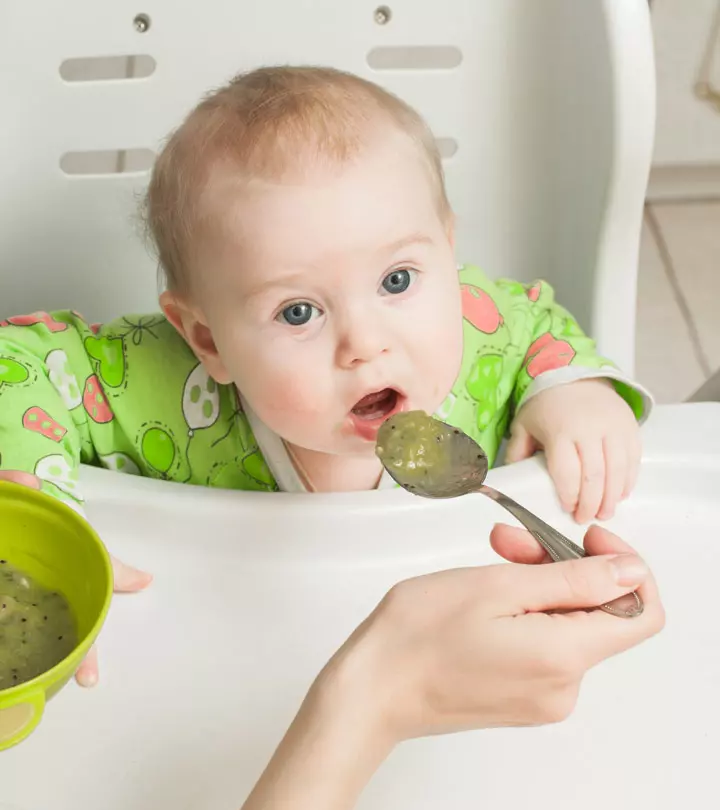
Image: ShutterStock
As the baby crosses the six-month mark, parents are definitely excited to see their little one grow. But they’re also confused about how and what solid foods to offer to them, along with breastmilk. Out of many delectable fruits available out there, kiwis for babies are a good choice, thanks to their nutritional profile and texture. Naturally, the primary choice of first foods for babies, but what makes kiwi special. Delve into this post to learn more about the nutritional value, health benefits, possible side effects of this fruit. We also bring you some interesting kiwi recipes for babies.

Key Pointers
- Kiwi is a nutrient-dense fruit that contains vitamin A, vitamin C, folate, fiber, potassium, and antioxidants.
- Parents can introduce kiwi to babies when they are between eight to ten months old.
- The health benefits of kiwi include boosting the immune system, relieving constipation, and protecting against cancer.
- It is important to avoid offering kiwi to a baby if they show allergic reactions to papaya, latex, sesame seeds, or pineapple.
- Some delicious kiwi recipes for babies include kiwi and apple puree, kiwi and banana mash, and kiwi and avocado puree.
When To Introduce Kiwi To A Baby?

- The introduction of kiwis to babies is recommended between the ages of eight and ten months due to their acidic nature.
- For any food allergies in babies or earlier diaper rashes, consider introducing the fruit between 10 and 12 months.
- In case your family has a history of kiwi food allergy (1), seek doctor’s advice before introducing your baby to kiwi.
- Even though its acidic nature prompts mouth rashes or bottom rashes, the fruit is generally not a high allergy risk. In fact, kiwi fruits are power packed with nutrition that may aid the appropriate growth and development of your baby.
Nutritional Facts Of Kiwi
| Kiwifruit, fresh 1.00 2 inches 69.00 grams | Calories: 42 GI: low |
|---|---|
| Nutrient | Amount |
| vitamin C | 63.96 mg |
| vitamin K | 27.81 mcg |
| copper | 0.09 mg |
| fiber | 2.07 g |
| vitamin E | 1.01 mg (ATE) |
| potassium | 215.28 mg |
| folate | 17.25 mcg |
| manganese | 0.07 mg |
Health Benefits Of Kiwi For Babies

- Kiwis are rich in Vitamin C, Vitamin A, potassium, fiber, folate, and antioxidants.
- One serving of kiwi fruit for babies offers 230% of recommended amount of Vitamin C per day, which helps in boosting the immune system., increasing iron absorption from other foods, and healing wounds.
- Kiwi aids digestion, provides relief from constipation and is rich in disease-fighting antioxidants. It offers 16% of the RDA for fiber.
- The fruit is rich in phytonutrients, which repair DNA, and protect against few cancers.
- According to the CDC Morbidity and Mortality Weekly Report (MMWR), around 6.0 to 6.4% of children aged zero to four years were affected by asthma. Interestingly, kiwi is believed to prevent asthma, lower fat in the blood, and reduce blood clot risk in later stages of life.
- Kiwi provides 10% of the RDA for folic acid and 10% RDA for Vitamin E.
- The fruit is also a source of calcium, iron, chromium, copper, potassium, magnesium, and zinc (2).
When To Avoid Offering Kiwis For Baby?

Refrain from offering kiwi to the baby if he shows allergic reactions to papaya, latex, sesame seeds, and pineapple as the allergic reactions to these foods tend to be linked with kiwi too. Allergy to kiwi is also commonly seen in people with hay fever (allergic rhinitis). Few fruits like kiwi, orange, raspberry, and strawberry may irritate the skin around your baby’s mouth when she eats it. This is common when she has eczema, but it is not harmful.
Symptoms indicating allergy towards kiwi include the sore mouth, swelling of the lips, tongue, face, or vomiting. Severe reactions include breathing difficulties and wheezing. Symptoms may appear around two hours after eating the culprit food. To check the way the baby reacts to kiwi, do introduce any new food in the previous meal and do not mix it with some other new food. Feed only little amounts first. Go ahead only if the baby is not showing any related allergies. Do remember that it is best to consult your doctor before introducing any new food to your baby.
How To Choose And Store Kiwis For Babies?
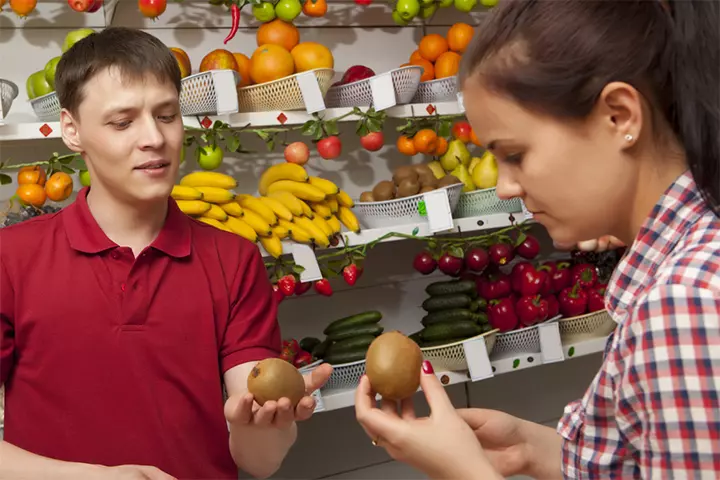
Picking organic kiwi is always good. However, kiwi is not among those fruits, which get contaminated due to pesticides. Do not select the ones with bruised skin, have visible indentations, are squisher-softer, or have damp spots. Pick a firm one and wait until they turn soft. To select the kiwifruit with sweetest taste, hold it between your thumb and forefinger and check if it yields to gentle pressure. Place an unripe kiwi in a paper bag with a banana or apple or pear to ripen the fruit within two days. Kiwis can be stored for three to four weeks in a refrigerator or a week on the counter.
 Did you know?
Did you know?Fresh Kiwi Recipes For Babies
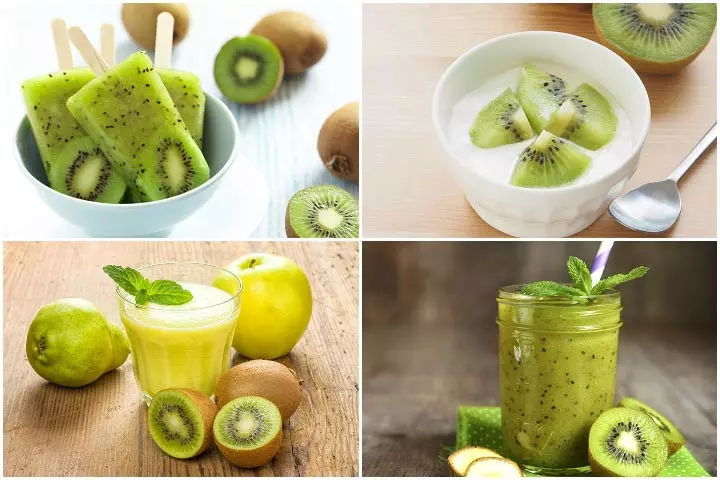
1. Kiwi Puree
You Need:
- 1 kiwi
How To:
- Peel the kiwi.
- Blend or puree it in a blender. This serves as an easy baby food recipe.
2. Kiwi Puree In Combinations
Kiwifruit can be slightly acidic, so trying it in combination with pureed banana is a good idea to feed it to your baby for the first time. This will help in developing the taste, and your toddler would want to have more of it. You may also try kiwi puree combinations with apple, pear, or other fruit purees for kids. Your baby would love the combination of apple, kiwi, and pear.
You Need:
- 1 kiwi
- 1 banana or apple or pear
How To:
- Peel and chop the fruits.
- Blend or puree them in a blender.
A mother shares that she offers her baby mashed kiwis added to brown rice cereal (mixed in hot water). She says, “Daddy fed baby kiwifruit while he was having it. Baby kept on approaching her daddy, asking for more after tasting it. This is the body language to express her liking to one food. Hence, this weekend, kiwi fruit is added to her diet (i).”
3. Kiwi Salad
You Need:
- 1 kiwi, peeled and diced
- 1 pear, peeled and finely chopped
- 1/2 banana, peeled and diced
How To:
- Toss all the fruits in a bowl and add your favorite coatings like wheat germ or crushed cereal. This snack can also serve as a finger food option for those practicing baby-led weaning.
- You could also blend them all together in the processor to make it into a puree and add yogurt on top.
4. Kiwi Avocado Monster
You Need:
- 2 ripe kiwis
- 1/2 cup cubed mango
- 1 ripe avocado
How To:
- Peel and slice the kiwi.
- Peel and pit the avocado.
- Mix all the ingredients and blend them together.
5. Creamy Kiwi Dessert
You Need:
- 1 small kiwi, peeled and diced
- 4 fl oz (1/2 cup) natural yogurt
- 1 drop vanilla extract
How To:
- Mix the ingredients together, puree the mixture, or mash thoroughly.
6. Tempting Tropical Mash
You Need:
- 1 small kiwi, peeled and diced
- 1/2 avocado, peeled and diced
- 1 slice cantaloupe , peeled and diced
- 1/2 ripe banana, sliced
How To:
- Mash all ingredients together and serve a sweet, nutritious tropical treat!
7. Kiwi Baby Stew Recipe
You Need:
- 4 ripe kiwis, peeled and cut
- 1/2 cup apple juice or grape juice
How To:
- Mix the ingredients in a medium pot.
- Place the pot on low flame for 10 to 15 minutes until kiwi turns soft.
- After removing from heat, puree or mash it.
 Quick tip
Quick tip8. Kiwi Fruit Popsicles
You Need:
- 12 ripe kiwis, peeled
- 2 cups apple juice
How To:
- Puree kiwi in a blender until the green flesh is pureed and black seeds are intact.
- Add apple juice to the mixture and mix well.
- Fill the popsicle molds and place them in the freezer.
* This recipe is a great way to beat the heat during warmer months. The tasty treat and the cold popsicle greatly helps soothe inflamed gums of your teething baby.
9. Kiwi Tropicana Baby Blast
You Need:
- 2 ripe kiwis, peeled
- 1 mango, peeled and chopped
- 1 cup papaya, peeled and chopped
How To:
- Mix all the ingredients and blend them well.
- Serve cool.
10. Tropical Oats
You Need:
- 1/2 cup rolled oats
- 1 kiwi fruit, ripe, peeled and diced
- 1 mashed banana
- 3/4 cups water
- 1/4 cup apple juice
How To:
- Mix water and apple juice in a pan and boil.
- Add kiwi and oats to a pan, stir well.
- Boil once again and reduce the flame.
- Cook until it thickens or cook for ten minutes.
- Stir in mashed banana.
- Serve warm.
 Quick tip
Quick tipFrequently Asked Questions
1. Do we always have to peel kiwis before serving it to babies?
Do not serve kiwi with skin to babies as they can find it difficult to chew the skin and could choke on it. Slice off each end and remove the skin lengthwise. Or you may just cut the fruit in half and serve the inner part of the fruit to the baby with a spoon.
2. Can a baby eat kiwi seeds?
It is not necessary to remove the seeds from the kiwi while feeding them to a baby, as the seeds are tiny and do not pose a choking hazard. But this largely depends on the baby’s ability to tolerate varied textures. So, if your baby is not good at it, consider removing them.
3. Can we freeze kiwi puree?
It is not recommended to freeze kiwi fruit. Kiwi puree may be frozen (3), but it may be gritty/watery when thawed.
4. How much kiwi should babies eat?
When introducing kiwis, offer one or two teaspoons of mashed or pureed fruit. You may gradually increase the amount to half a cup if your baby tolerates it (5) (6).
5. Is there a risk of choking when giving kiwi to a baby?
The firm and slippery nature of kiwi may be a choking risk for babies. Thus, offer mashed or pureed kiwis initially. For older babies who can handle more textures, kiwi can be cut into small, soft pieces.
Kiwis can be a healthy choice of first foods for your baby. Abundant in vitamin C and A, fiber, and folate, kiwi helps in boosting the child’s immunity and prevents constipation, which is a common problem in babies. However, avoid giving it to your baby if they show allergic reactions. Otherwise, you can try some tasty kiwi recipes for your little one, so they have a variety and do not easily get bored of the fruit.
Infographic: Helpful Tips To Feed Kiwi To Babies
Kiwis can be a healthy choice of first food for your baby. Abundant in vitamins C and A, fiber, and folate, kiwi helps in boosting the child’s immunity, is easy-to-digest, and prevents constipation, which is a common problem in babies (7). However, since these fruits are acidic, there might also be some possible side effects. Check out the infographic below to learn about precautions to follow when introducing kiwis to your baby.
Some thing wrong with infographic shortcode. please verify shortcode syntax
Illustration: When Can Babies Eat Kiwi And Recipes To Try
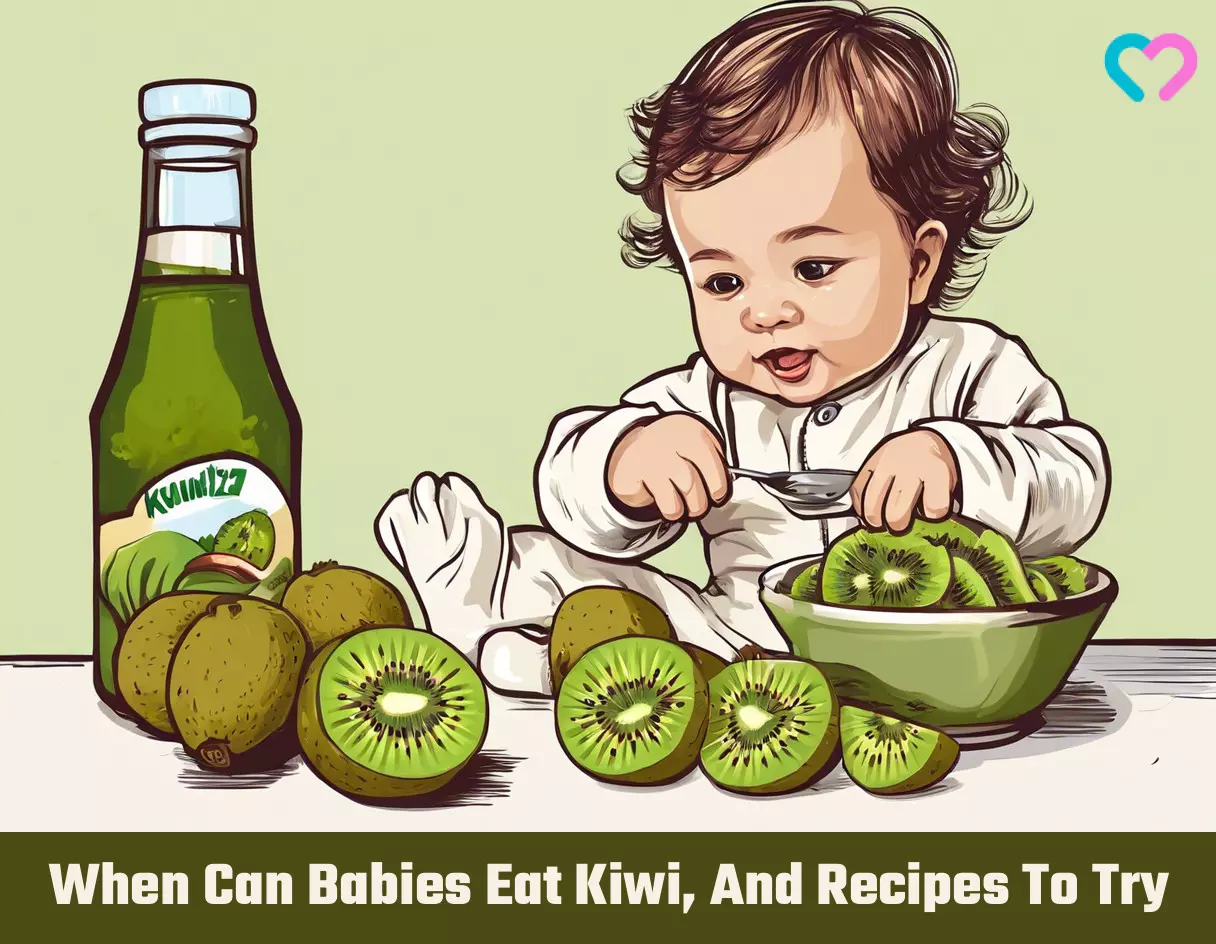
Image: Stable Diffusion/MomJunction Design Team
Embrace the journey of making delicious and nutritious baby food with this effortless Kiwi recipe. Tailored to meet your little one’s growing needs, it’s a must-try.
Personal Experience: Source
MomJunction articles include first-hand experiences to provide you with better insights through real-life narratives. Here are the sources of personal accounts referenced in this article.
i. Baby food-kiwifruit brown rice cereal.https://eatingpleasure.blogspot.com/2012/07/kiwifruit-brown-rice-cereal.html
References
- J S A Lucas et al.; (2004); Kiwi fruit is a significant allergen and is associated with differing patterns of reactivity in children and adults.
https://pubmed.ncbi.nlm.nih.gov/15248859/ - David P. Richardson et al.; (2018); The nutritional and health attributes of kiwifruit: a review.
https://www.ncbi.nlm.nih.gov/pmc/articles/PMC6267416/ - Feeding Your Baby 6 months to 1 year.
https://www.gov.mb.ca/fs/healthybaby/index.html - G.D.M.P.Madhusankha and R.C.N.Thilakarathna; (2025); Meat tenderization mechanism and the impact of plant exogenous proteases: A review.
https://www.sciencedirect.com/science/article/pii/S1878535220305281 - Starting Solid Foods.
https://www.healthychildren.org/English/ages-stages/baby/feeding-nutrition/Pages/Starting-Solid-Foods.aspx# - Feeding your baby: 6–12 months.
https://www.unicef.org/parenting/food-nutrition/feeding-your-baby-6-12-months - 6 Health benefits of Kiwi Fruit.
https://health.clevelandclinic.org/kiwi-benefits
Community Experiences
Join the conversation and become a part of our nurturing community! Share your stories, experiences, and insights to connect with fellow parents.
Read full bio of Dt. Pallavi Jassal
Read full bio of Swati Patwal
Read full bio of Rohit Garoo
Read full bio of Vidya Tadapatri





